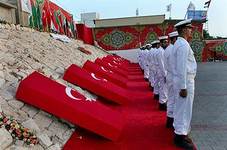30 june 2016
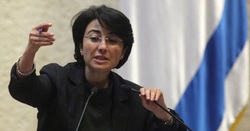
Israeli Prime Minister Binyamin Netanyahu spoke Wednesday afternoon with Attorney General Avichai Mandelblit regarding the possible expulsion of Arab MK Hanin Zoabi from the Knesset.
Netanyahu’s demand came following Zoabi’s condemnation of the continued Israeli crimes against Palestinians and calls for lifting Gaza siege. “With her actions and lies she crossed every line and she has no place in the Knesset,” Netanyahu claimed.
Earlier on Wednesday Zoabi caused an uproar on the Knesset floor when she strongly condemned the Israeli forces’ videotaped attack on Turkish activists who were killed during their participation in Freedom Flotilla in 2010.
The murderer has to pay compensation for the families of Turkish victims, she said during a debate discussing the newly-signed deal between Israel and Turkey.
Zoabi considered the deal as a “murder confession.” Zoabi demanded the Israeli government issue an apology both to the “political activists” aboard the Mavi Marmara, on which she sailed in solidarity, and to herself, from those who “incited against [her] for six years.”
During the debate, Israeli MKs tried to physically attack Zoabi following her address. Several MKs began shouting and moved toward the podium to complain.
“Come hit me! Come hit me!” Zoabi shouted to the MKs who were pointing and yelling at her. As MKs mobbed the stage, Zoabi shouted “they murdered” and “shut up” repeatedly.
When Deputy Knesset Speaker Hamad Amar (Yisrael Beytenu) asked her to apologize, Zoabi said: “The Israeli soldiers who murdered are the ones who need to apologize! You need to apologize!”
The Joint List strongly denounced the attack, considering it a “fascist assault.” It added, "The racist and bloody attack against Joint List MKs has notably escalated, calling for an end to the continued incitement against Arab MKs and Hanan Zoabi in particular".
In May 2010, a flotilla of six ships headed to Gaza but Israeli navy forces intercepted and boarded them and forced them to dock in Israel after brutally attacking the passengers.
Nine of the Turkish activists were killed during the attack. Zoabi’s comments came a day after Israel signed a deal with Turkey to restore ties, after years of frosty relations exacerbated by the flotilla attack. The deal stipulates that Israel would pay Turkey $20 million in compensation to families of the victims.
Netanyahu’s demand came following Zoabi’s condemnation of the continued Israeli crimes against Palestinians and calls for lifting Gaza siege. “With her actions and lies she crossed every line and she has no place in the Knesset,” Netanyahu claimed.
Earlier on Wednesday Zoabi caused an uproar on the Knesset floor when she strongly condemned the Israeli forces’ videotaped attack on Turkish activists who were killed during their participation in Freedom Flotilla in 2010.
The murderer has to pay compensation for the families of Turkish victims, she said during a debate discussing the newly-signed deal between Israel and Turkey.
Zoabi considered the deal as a “murder confession.” Zoabi demanded the Israeli government issue an apology both to the “political activists” aboard the Mavi Marmara, on which she sailed in solidarity, and to herself, from those who “incited against [her] for six years.”
During the debate, Israeli MKs tried to physically attack Zoabi following her address. Several MKs began shouting and moved toward the podium to complain.
“Come hit me! Come hit me!” Zoabi shouted to the MKs who were pointing and yelling at her. As MKs mobbed the stage, Zoabi shouted “they murdered” and “shut up” repeatedly.
When Deputy Knesset Speaker Hamad Amar (Yisrael Beytenu) asked her to apologize, Zoabi said: “The Israeli soldiers who murdered are the ones who need to apologize! You need to apologize!”
The Joint List strongly denounced the attack, considering it a “fascist assault.” It added, "The racist and bloody attack against Joint List MKs has notably escalated, calling for an end to the continued incitement against Arab MKs and Hanan Zoabi in particular".
In May 2010, a flotilla of six ships headed to Gaza but Israeli navy forces intercepted and boarded them and forced them to dock in Israel after brutally attacking the passengers.
Nine of the Turkish activists were killed during the attack. Zoabi’s comments came a day after Israel signed a deal with Turkey to restore ties, after years of frosty relations exacerbated by the flotilla attack. The deal stipulates that Israel would pay Turkey $20 million in compensation to families of the victims.
28 june 2016
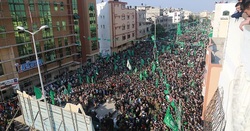
The Hamas Movement has expressed its sincere appreciation and thanks to Turkish president Recep Erdogan, his government and people for all the efforts they have made to help the Palestinians in the Gaza Strip and mitigate the brunt of the blockade imposed on them.
"These efforts are consistent with the noble Turkish position towards the Palestinian cause and its role in supporting the Palestinian people's steadfastness and standing by their side," Hamas stated in a press release on Monday.
The Movement also expressed hope that Turkey would continue to play a major role in supporting the Palestinian cause, ending the blockade on Gaza completely and pressuring the Israeli occupation to stop its attacks on the Palestinian people, their land and holy sites.
Its statement paid tribute to the martyrs of Mavi Marmara ship, "who sacrificed themselves for Palestine and its people" as well as to the Freedom Flotilla activists who suffered injuries during their bid to break the Gaza siege.
Turkey on Monday announced it reached an agreement to repair ties with Israel after six years of strained relations following a deadly Israeli raid on a Turkish ship delivering aid to Gaza in 2010. 10 Turkish activists were killed in that Israeli assault.
The agreement includes steps to alleviate the Israeli blockade on Gaza and will facilitate Turkey's efforts to establish projects and deliver aid for the embattled enclave.
"These efforts are consistent with the noble Turkish position towards the Palestinian cause and its role in supporting the Palestinian people's steadfastness and standing by their side," Hamas stated in a press release on Monday.
The Movement also expressed hope that Turkey would continue to play a major role in supporting the Palestinian cause, ending the blockade on Gaza completely and pressuring the Israeli occupation to stop its attacks on the Palestinian people, their land and holy sites.
Its statement paid tribute to the martyrs of Mavi Marmara ship, "who sacrificed themselves for Palestine and its people" as well as to the Freedom Flotilla activists who suffered injuries during their bid to break the Gaza siege.
Turkey on Monday announced it reached an agreement to repair ties with Israel after six years of strained relations following a deadly Israeli raid on a Turkish ship delivering aid to Gaza in 2010. 10 Turkish activists were killed in that Israeli assault.
The agreement includes steps to alleviate the Israeli blockade on Gaza and will facilitate Turkey's efforts to establish projects and deliver aid for the embattled enclave.
27 june 2016
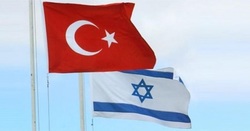
A Turkish high-level official speaking on condition of anonymity said that the agreement between his country and Israel which was reached on Sunday in Rome involved no articles on Hamas Movement, according to Anadolu agency.
The Turkish official also said that Israel answered Turkey’s conditions which were to apologize for the Freedom Flotilla incident, pay compensation to the families of those killed, and end the blockade of the Gaza Strip.
According to the official, the agreement between Israel and Turkey includes the entry of humanitarian aid into Gaza by Turkey in addition to investment in the infrastructure and housing in Gaza.
The Turkish-Palestinian Friendship Hospital will be inaugurated as soon as possible, he further said. The agreement also stipulates for the construction of new power and water desalination plants in the Gaza Strip in addition to the increase of Gaza’s portions of water and electricity.
The Turkish official also said that Turkey will continue its strong support of Palestine and the Palestinian people.
Hebrew newspapers had previously reported that the reconciliation agreement stated that Turkey will not allow Hamas Movement to practice any military actions against Israel from Turkish lands while it can still retain its offices in Turkey for diplomatic activities.
The Hebrew reports also alleged that for that reason, Israel waived its condition to expel leaders of Hamas out of Turkey including Hamas’s leader Saleh al-Arouri.
All of the alleged claims were denied by the Turkish official.
Relations between Israel and Turkey were severed after the Freedom Flotilla incident in 2010 when a convoy of six ships, including one flying under the Turkish flag tried to approach the Gaza Strip with humanitarian aid and activists on board.
The flotilla was blocked and stormed by Israeli forces, resulting in a fight with Muslim activists aboard the main ship, in which nine Turkish citizens were killed. The incident led to deterioration of the diplomatic relations between the two countries.
The Turkish official also said that Israel answered Turkey’s conditions which were to apologize for the Freedom Flotilla incident, pay compensation to the families of those killed, and end the blockade of the Gaza Strip.
According to the official, the agreement between Israel and Turkey includes the entry of humanitarian aid into Gaza by Turkey in addition to investment in the infrastructure and housing in Gaza.
The Turkish-Palestinian Friendship Hospital will be inaugurated as soon as possible, he further said. The agreement also stipulates for the construction of new power and water desalination plants in the Gaza Strip in addition to the increase of Gaza’s portions of water and electricity.
The Turkish official also said that Turkey will continue its strong support of Palestine and the Palestinian people.
Hebrew newspapers had previously reported that the reconciliation agreement stated that Turkey will not allow Hamas Movement to practice any military actions against Israel from Turkish lands while it can still retain its offices in Turkey for diplomatic activities.
The Hebrew reports also alleged that for that reason, Israel waived its condition to expel leaders of Hamas out of Turkey including Hamas’s leader Saleh al-Arouri.
All of the alleged claims were denied by the Turkish official.
Relations between Israel and Turkey were severed after the Freedom Flotilla incident in 2010 when a convoy of six ships, including one flying under the Turkish flag tried to approach the Gaza Strip with humanitarian aid and activists on board.
The flotilla was blocked and stormed by Israeli forces, resulting in a fight with Muslim activists aboard the main ship, in which nine Turkish citizens were killed. The incident led to deterioration of the diplomatic relations between the two countries.
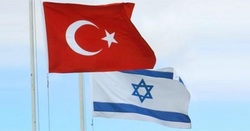
Israel and Turkey on Sunday reached agreement to normalize ties, senior officials from both countries said, to end a rift over the Israeli navy's killing of 10 Turkish pro-Palestinian activists who tried to sail to the blockaded Gaza Strip in 2010.
According to Reuters, a formal announcement on the restoration of ties and the details of the agreement were expected on Monday at 1000 GMT by Israeli Prime Minister Benjamin Netanyahu in Rome, and Turkish Prime Minister Binali Yildirim in Ankara.
Netanyahu traveled to Rome on Sunday to meet U.S. Secretary of State John Kerry and Israeli and Turkish officials were also in the Italian capital to finalize the deal.
Israel, which had already offered its apologies - one of Ankara's three conditions for a deal - for its lethal raid on the Mavi Marmara aid ship, agreed to pay out $20 million to the bereaved and injured, the Israeli official said in a briefing to Israeli reporters traveling with Netanyahu.
Under the deal, Turkey will deliver humanitarian aid and other non-military products to Gaza and carry out infrastructure projects including residential buildings and a hospital in the Strip, the senior Turkish official said.
Concrete steps will be taken to address the water and power crisis in the city. A senior Israeli official said senior foreign ministry diplomats from both countries would separately sign parallel agreements on Tuesday.
A 2011 report commissioned by U.N. Secretary-General Ban ki-Moon faulted Israel for its marines' use of lethal force as they stormed the Mavi Marmara and brawled with activists on the deck.
According to Reuters, a formal announcement on the restoration of ties and the details of the agreement were expected on Monday at 1000 GMT by Israeli Prime Minister Benjamin Netanyahu in Rome, and Turkish Prime Minister Binali Yildirim in Ankara.
Netanyahu traveled to Rome on Sunday to meet U.S. Secretary of State John Kerry and Israeli and Turkish officials were also in the Italian capital to finalize the deal.
Israel, which had already offered its apologies - one of Ankara's three conditions for a deal - for its lethal raid on the Mavi Marmara aid ship, agreed to pay out $20 million to the bereaved and injured, the Israeli official said in a briefing to Israeli reporters traveling with Netanyahu.
Under the deal, Turkey will deliver humanitarian aid and other non-military products to Gaza and carry out infrastructure projects including residential buildings and a hospital in the Strip, the senior Turkish official said.
Concrete steps will be taken to address the water and power crisis in the city. A senior Israeli official said senior foreign ministry diplomats from both countries would separately sign parallel agreements on Tuesday.
A 2011 report commissioned by U.N. Secretary-General Ban ki-Moon faulted Israel for its marines' use of lethal force as they stormed the Mavi Marmara and brawled with activists on the deck.
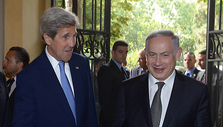
After years of negotiations, Israel and Turkey are expected to officially announce their reconciliation agreement in Rome; Netanyahu and Kerry are in Rome for the momentous occasion.
Prime Minister Netanyahu landed in Rome for the official announcement of the Israel-Turkey reconciliation agreement together with US Secretary of State John Kerry on Monday morning.
The Prime Minster said when describing the agreement that "I updated Secretary Kerry about our agreement with Turkey, which we will show at noon. I think it's an important step here to normalize relations on one side. It has also immense implications for the Israeli economy, and I use that word advisedly – immense implications for the Israeli economy and I mean positive immense implications.
Kerry also said that "we had a very long meeting last night in which we discussed many different issues, but we focused significantly on the challenge of beating back terrorism and beating back terrorism specifically with respect to Israel's challenge in the Sinai, in the Golan Heights, where ISIS is now visible, positioned in places, and also the challenge of violence stemming from extremism in Gaza and the West Bank."
However, not all are happy about the agreement, and a lot of opposition to it has come from the Israeli public and Israeli politicians.
Opposition Chairman Isaac Herzog said that "the deal with Turkey is part of the Prime Minister's modus operandi. He began with grandiose statements, continued with promises, and ended with subservience. The return of relations with Turkey is an important political goal, but the reparations to those who attacked IDF soldiers is unacceptable, especially when it is signed by the Netanyahu – Bennet – Lieberman threesome. All should know that the leadership of the right is paying reparations to those who have attacked our sons."
He continued, saying "besides this incomprehensible compensation, my heart is torn to see the indifference and the ignoring of the families of those who are missing (in Gaza), who are yelling at the top of their lungs. Yet their cries are not getting through to the hearts of the people who sit in the cabinet."
Meanwhile, Former Defense Minister Amir Perez said during a conference in Herzeliya marking 10 years since the Second Lebanon War that "if a leftist government would have made this agreement, (the conference attendees) wouldn't have been able to enter the conference because of all of the protestors who would have been outside."
Gabi Levi, the Israeli Ambassador to Turkey during the Marmara incident, said in an interview Monday morning that "this crisis should have been ended several yeas ago as all of the parameters of the deal were known. But it's still better late than never."
"The reason the agreement took so long in coming is because of the egos of the two countries, something which is accepted and known. But the personal issues are less important than the relations between countries. There are clear interests between the two countries – and to maintain good and tight relations – and I'm worried that it will take a lot more time until we get back to the deep seeded relations which we have before this crisis. But it must all be done through the right processes and not in a flashy manner, "the former ambassador continued.
US Vice President Joe Biden sent a message saying that Netanyahu called and thanked him for during the talks with the Turks. Biden praised Netanyahu on the headway made in regards to reconciliation with Turkey, and noted the security and economic benefits which this reconciliation agreement will have for not only the two countries, but also for the Middle East as a whole.
Against the backdrop of the reconciliation agreement, the heads of three regional councils bordering the Gaza Strip sent a letter to Netanyahu, Lieberman, and Transportation Minister Israel Katz, saying "we welcome any political process which brings quiet to the south. However, we are concerned about the implications of sending more humanitarian aid to Gaza as stipulated in the (reconciliation) agreement, but without the opening of another crossing into Gaza. We therefore request the immediate opening of the Erez Crossing to move goods into Gaza and to ease the heavy truck traffic which has made the lives of the residents in the south unbearable."
Prime Minister Netanyahu landed in Rome for the official announcement of the Israel-Turkey reconciliation agreement together with US Secretary of State John Kerry on Monday morning.
The Prime Minster said when describing the agreement that "I updated Secretary Kerry about our agreement with Turkey, which we will show at noon. I think it's an important step here to normalize relations on one side. It has also immense implications for the Israeli economy, and I use that word advisedly – immense implications for the Israeli economy and I mean positive immense implications.
Kerry also said that "we had a very long meeting last night in which we discussed many different issues, but we focused significantly on the challenge of beating back terrorism and beating back terrorism specifically with respect to Israel's challenge in the Sinai, in the Golan Heights, where ISIS is now visible, positioned in places, and also the challenge of violence stemming from extremism in Gaza and the West Bank."
However, not all are happy about the agreement, and a lot of opposition to it has come from the Israeli public and Israeli politicians.
Opposition Chairman Isaac Herzog said that "the deal with Turkey is part of the Prime Minister's modus operandi. He began with grandiose statements, continued with promises, and ended with subservience. The return of relations with Turkey is an important political goal, but the reparations to those who attacked IDF soldiers is unacceptable, especially when it is signed by the Netanyahu – Bennet – Lieberman threesome. All should know that the leadership of the right is paying reparations to those who have attacked our sons."
He continued, saying "besides this incomprehensible compensation, my heart is torn to see the indifference and the ignoring of the families of those who are missing (in Gaza), who are yelling at the top of their lungs. Yet their cries are not getting through to the hearts of the people who sit in the cabinet."
Meanwhile, Former Defense Minister Amir Perez said during a conference in Herzeliya marking 10 years since the Second Lebanon War that "if a leftist government would have made this agreement, (the conference attendees) wouldn't have been able to enter the conference because of all of the protestors who would have been outside."
Gabi Levi, the Israeli Ambassador to Turkey during the Marmara incident, said in an interview Monday morning that "this crisis should have been ended several yeas ago as all of the parameters of the deal were known. But it's still better late than never."
"The reason the agreement took so long in coming is because of the egos of the two countries, something which is accepted and known. But the personal issues are less important than the relations between countries. There are clear interests between the two countries – and to maintain good and tight relations – and I'm worried that it will take a lot more time until we get back to the deep seeded relations which we have before this crisis. But it must all be done through the right processes and not in a flashy manner, "the former ambassador continued.
US Vice President Joe Biden sent a message saying that Netanyahu called and thanked him for during the talks with the Turks. Biden praised Netanyahu on the headway made in regards to reconciliation with Turkey, and noted the security and economic benefits which this reconciliation agreement will have for not only the two countries, but also for the Middle East as a whole.
Against the backdrop of the reconciliation agreement, the heads of three regional councils bordering the Gaza Strip sent a letter to Netanyahu, Lieberman, and Transportation Minister Israel Katz, saying "we welcome any political process which brings quiet to the south. However, we are concerned about the implications of sending more humanitarian aid to Gaza as stipulated in the (reconciliation) agreement, but without the opening of another crossing into Gaza. We therefore request the immediate opening of the Erez Crossing to move goods into Gaza and to ease the heavy truck traffic which has made the lives of the residents in the south unbearable."
head of a flotilla - sponsored by a group called IHH - attempting to sail to Gaza. The ship was boarded after repeated attempts to have the ship sail to the Israeli port of Ashdod so that their "humanitarian aid" could be sent to Gaza via the proper channels.
A press conference is to be held at 1:00pm in Rome where the official announcement of the reconciliation agreement will occur.
Video footage that surfaced from the event shows the soldiers being brutally attacked once on board the vessel, with some even being kidnapped for a short period of time.
A high ranking political official said that "the issue of the $21 million dollars was settled three years ago. The money will be transferred only after a law which terminates all ongoing legal proceedings in Turkish courts against Israeli officers involved in the Marmara incident is passed in Turkish parliament. Why did the agreement take so long? Because of the Gaza blockade and terror coming from Turkey."
Following the Mavi Marmara incident, an investigative committee headed by Former Supreme Court Justice Ya'akov Turkel was established to investigate. The committee's report, which came out in 2011, said that IHH activists cut the railings of the ship with circular saws to create steel rods with which to attack the soldiers, despite attempts from vessel's crew to stop them.
Regarding the decision to attack the soldiers, the Turkish document reported that "members of IHH acted violently against IDF soldiers on the Mavi Marmara, and had armed themselves with different types of weapons which could have caused death or serious injury. The activists also used firearms against IDF forces during the event."
The captain of the ship reported that he was shocked by the "considerable number of weapons" which were on the ship.
Meanwhile, the head of the naval commando unit which took over the ship said in his testimony before the committee that the violent reaction to the takeover of the ship seemed planned. "No ordinary civilian knows how to fight in the dark while wearing a gas mask for an extended period of time, knows how to steal a weapon (from a soldier), and knows how to cock it and shoot it without flinching. That is, unless they were trained to do it beforehand."
One of the naval commandos who was on the ship and was forcibly taken into the cargo hold by the "peace activists" testified that "(the activists) were all well built, and it seemed as if they're goal was to attack us."
He continued, explaining that it seemed that the activists were comprised of several different groups. "It seemed to me that there was one group which was equipped with weapons with which to attack us, and while they were taking me below deck, there was another group with cameras taking pictures of me. I also heard women screaming in English 'hit him!' amongst other things."
One of the commanders said that he has no doubt that "the terrorists on board the ship planned, organized, and expected the incident, and planned to kill soldiers." He explained that "they were prepared like a military unit - they had gas masks and bullet proof vests, and had both firearms and melee weapons. They had a well organized military structure which was divided into units, and the units spoke amongst each other using walkie-talkies."
A high ranking Israeli official claimed that one of the main parts of the reconciliation agreement is that the IDF soldiers and commanders who took part in the operation to capture the ship will not be prosecuted in the International Criminal Court in The Hague. Also in the agreement is a clause which commits Turkey to preventing Hamas attacks on Israel and Israeli citizens from or on Turkish soil.
Earlier negotiations between Israel and Turkey included the issue of returning two captive Israeli citizens from Hamas—one of them Avra Mangisto, and a Bedouin resident from the south of Israel—in addition to the return of the bodies of IDF soldiers Hadar Goldin and Oron Shaul. The final agreement, does not mention this, and Hamas is not included as a party in the agreement. According to an Israeli official, Israel requested and received a letter from Erdoğan instructing Turkish agencies to work toward settling the matter of Israeli captives and its missing soldiers.
In response to their being attacked, IDF soldiers opened fire on the passengers aboard the Marmara, killing nine Turkish citizens, one of whom was also a US citizen. By this point, Turkish-Israeli relations were already tense over Operation Cast Lead in 2008, but the altercation on board the Marmara seemed to cross a line, as Turkey recalled its ambassador from Tel Aviv following the incident. It has since then been demanding that Israel apologize for the event and appease the victims’ families, with Israel refusing and claiming that the actions of some of the protestors were blatant acts of terrorism.
During the negotiations process between the two countries, Prime minister Benjamin Netanyahu had reportedly been concerned that current Defense Minister Avigdor Lieberman would foil the agreement. Among other statements, Lieberman was quoted as saying that developing closer ties with Erdoğan was ridiculous, that Erdoğan is akin to Goebbels’ successor and that Turkey itself harbors top Hamas terrorists, including those responsible for the 2014 kidnapping and murdering of the three Israeli boys from Gush Etzion in. During their own negotiations to have Lieberman’s party Yisrael Beytenu join the Coalition, Netanyahu made it clear to him that he sees reaching a conciliatory agreement with Turkey a very important goal, and that he expected Lieberman not to stand in its way.
A press conference is to be held at 1:00pm in Rome where the official announcement of the reconciliation agreement will occur.
Video footage that surfaced from the event shows the soldiers being brutally attacked once on board the vessel, with some even being kidnapped for a short period of time.
A high ranking political official said that "the issue of the $21 million dollars was settled three years ago. The money will be transferred only after a law which terminates all ongoing legal proceedings in Turkish courts against Israeli officers involved in the Marmara incident is passed in Turkish parliament. Why did the agreement take so long? Because of the Gaza blockade and terror coming from Turkey."
Following the Mavi Marmara incident, an investigative committee headed by Former Supreme Court Justice Ya'akov Turkel was established to investigate. The committee's report, which came out in 2011, said that IHH activists cut the railings of the ship with circular saws to create steel rods with which to attack the soldiers, despite attempts from vessel's crew to stop them.
Regarding the decision to attack the soldiers, the Turkish document reported that "members of IHH acted violently against IDF soldiers on the Mavi Marmara, and had armed themselves with different types of weapons which could have caused death or serious injury. The activists also used firearms against IDF forces during the event."
The captain of the ship reported that he was shocked by the "considerable number of weapons" which were on the ship.
Meanwhile, the head of the naval commando unit which took over the ship said in his testimony before the committee that the violent reaction to the takeover of the ship seemed planned. "No ordinary civilian knows how to fight in the dark while wearing a gas mask for an extended period of time, knows how to steal a weapon (from a soldier), and knows how to cock it and shoot it without flinching. That is, unless they were trained to do it beforehand."
One of the naval commandos who was on the ship and was forcibly taken into the cargo hold by the "peace activists" testified that "(the activists) were all well built, and it seemed as if they're goal was to attack us."
He continued, explaining that it seemed that the activists were comprised of several different groups. "It seemed to me that there was one group which was equipped with weapons with which to attack us, and while they were taking me below deck, there was another group with cameras taking pictures of me. I also heard women screaming in English 'hit him!' amongst other things."
One of the commanders said that he has no doubt that "the terrorists on board the ship planned, organized, and expected the incident, and planned to kill soldiers." He explained that "they were prepared like a military unit - they had gas masks and bullet proof vests, and had both firearms and melee weapons. They had a well organized military structure which was divided into units, and the units spoke amongst each other using walkie-talkies."
A high ranking Israeli official claimed that one of the main parts of the reconciliation agreement is that the IDF soldiers and commanders who took part in the operation to capture the ship will not be prosecuted in the International Criminal Court in The Hague. Also in the agreement is a clause which commits Turkey to preventing Hamas attacks on Israel and Israeli citizens from or on Turkish soil.
Earlier negotiations between Israel and Turkey included the issue of returning two captive Israeli citizens from Hamas—one of them Avra Mangisto, and a Bedouin resident from the south of Israel—in addition to the return of the bodies of IDF soldiers Hadar Goldin and Oron Shaul. The final agreement, does not mention this, and Hamas is not included as a party in the agreement. According to an Israeli official, Israel requested and received a letter from Erdoğan instructing Turkish agencies to work toward settling the matter of Israeli captives and its missing soldiers.
In response to their being attacked, IDF soldiers opened fire on the passengers aboard the Marmara, killing nine Turkish citizens, one of whom was also a US citizen. By this point, Turkish-Israeli relations were already tense over Operation Cast Lead in 2008, but the altercation on board the Marmara seemed to cross a line, as Turkey recalled its ambassador from Tel Aviv following the incident. It has since then been demanding that Israel apologize for the event and appease the victims’ families, with Israel refusing and claiming that the actions of some of the protestors were blatant acts of terrorism.
During the negotiations process between the two countries, Prime minister Benjamin Netanyahu had reportedly been concerned that current Defense Minister Avigdor Lieberman would foil the agreement. Among other statements, Lieberman was quoted as saying that developing closer ties with Erdoğan was ridiculous, that Erdoğan is akin to Goebbels’ successor and that Turkey itself harbors top Hamas terrorists, including those responsible for the 2014 kidnapping and murdering of the three Israeli boys from Gush Etzion in. During their own negotiations to have Lieberman’s party Yisrael Beytenu join the Coalition, Netanyahu made it clear to him that he sees reaching a conciliatory agreement with Turkey a very important goal, and that he expected Lieberman not to stand in its way.
26 june 2016
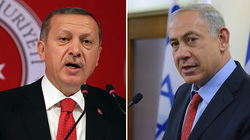
The two sides are meeting in order to finalize a deal to normalize relations; It appears that missing Israeli Avera Mengistu and the remains of soldiers Oron Shaul and Hadar Goldin will not be mentioned in the final draft.
Israeli and Turkish negotiation teams were set to meet Sunday in Rome, in order to finalize the two countries' reconciliation deal, six years after their relationship soured due to the Mavi Marmara incident.
Most of the deal's details have already been agreed upon, but a number of adjustments are expected to be made. The two sides are hoping to announce the conclusion of negotiations by day's end, and perhaps even partake in an initial signing.
The deal is expected to be approved by the Israeli Security Cabinet and the Turkish government on Wednesday while the official signing is expected to take place next month. The signing, however, will only come after President Racep Tayyip Erdogan's government makes legislative changes which will oversee the cessation of lawsuits brought against IDF officers in Turkey.
There agreement reportedly comprises 8 central points:
1. Israel and Turkey will reestablish full diplomatic and normalized relations, including the exchange of Ambassadors and mutual state visits. The two parties will also committ themselves to refraining from acting in a manner deemed harmful to their respective interests in international fora such as NATO and the UN.
2. The Turks will withdraw demands that the blockade on Gaza be lifted in exchange for an Israeli pledge to allow for the delivery of Turkish aid to Gaza via the Ashdod port, after it goes through Israeli inpection. Israel will also allow the Turks to build a new power plant, desalination plant (in cooperation with Germany), and hospital in Gaza.
3. The agreement does not contain a clause dealing with the return of Israeli civilian Avera Mengiustu, who has been missing in Gaza since September of 2014, or the return of the remains of fallen soldiers Oron Shaul and Hadar Goldin who were killed in Operation Protective Edge earlier that same year. The Turkish government, however, promises that it will undertake efforts to secure the release of the soldiers' remains through its contacts with Hamas. It also agreed to be a mediator between Israel and Hamas if necessary.
4. Israel will transfer approximately $21 million to a Turkish humanitarian fund that will provide money to the families of those who were killed or wounded in the Marmara incident.
5. Turkey will terminate all ongoing legal proceedings in Turkish courts against Israeli officers invloved in the Marmara incident.
6. Turkey will prevent Hamas from using the country as a base from which to work against Israel. In turn, Israel has rescinded its demand that Turkey expel Hamas' command center from the country. Senior Hamas member Salah al-Arouri, who was responsible for the kidnapping and murder of Israeli teenagers Gil-Ad Shaer, Naftali Frenkel and Eyal Yifrach in Gush Etzion in the summer of 2014, is no longer in Turkey, and the authorities there have promised that he would not be allowed to return.
7. The two nations will resume their military cooperation and begin sharing intelligence once more.
8. The two countries will begin official talks regarding the laying of a gas pipeline, so that Israel's natural gas reserves may be extracted and transported. Turkey will express interest in purchasing gas from Israel and selling it to European markets.
Israel' representatives in the negotiation were Joseph Chicanover and Brig. Gen. (ret) Yaakov Nagel. Their Turkish counterpart was Turkish Foreign Ministry Undersecretary Feridun Sinirlioglu.
Israel updated Russia, Egypt, Greece, and Cyprus about the main points of the agreement, making it clear that no actions will be undertaken at the expense of its relationship with them.
Prime Minister Netanyahu spoke of the coming agreement at the start of his government's weekly Cabinet meeting on Sunday, saying, "There is a lot of misinformation and disinformation regarding the possible agreement that is being formulated with Turkey and therefore I would like to make it clear: We are continuing our constant efforts, both open and in secret, to bring Oron Shaul and Hadar Goldin back to Israel, may their memories be blessed, and also the two Israelis being held in Gaza. We are in continuous contact with the families and we will neither rest nor be silent until we bring the boys back home."
Israeli and Turkish negotiation teams were set to meet Sunday in Rome, in order to finalize the two countries' reconciliation deal, six years after their relationship soured due to the Mavi Marmara incident.
Most of the deal's details have already been agreed upon, but a number of adjustments are expected to be made. The two sides are hoping to announce the conclusion of negotiations by day's end, and perhaps even partake in an initial signing.
The deal is expected to be approved by the Israeli Security Cabinet and the Turkish government on Wednesday while the official signing is expected to take place next month. The signing, however, will only come after President Racep Tayyip Erdogan's government makes legislative changes which will oversee the cessation of lawsuits brought against IDF officers in Turkey.
There agreement reportedly comprises 8 central points:
1. Israel and Turkey will reestablish full diplomatic and normalized relations, including the exchange of Ambassadors and mutual state visits. The two parties will also committ themselves to refraining from acting in a manner deemed harmful to their respective interests in international fora such as NATO and the UN.
2. The Turks will withdraw demands that the blockade on Gaza be lifted in exchange for an Israeli pledge to allow for the delivery of Turkish aid to Gaza via the Ashdod port, after it goes through Israeli inpection. Israel will also allow the Turks to build a new power plant, desalination plant (in cooperation with Germany), and hospital in Gaza.
3. The agreement does not contain a clause dealing with the return of Israeli civilian Avera Mengiustu, who has been missing in Gaza since September of 2014, or the return of the remains of fallen soldiers Oron Shaul and Hadar Goldin who were killed in Operation Protective Edge earlier that same year. The Turkish government, however, promises that it will undertake efforts to secure the release of the soldiers' remains through its contacts with Hamas. It also agreed to be a mediator between Israel and Hamas if necessary.
4. Israel will transfer approximately $21 million to a Turkish humanitarian fund that will provide money to the families of those who were killed or wounded in the Marmara incident.
5. Turkey will terminate all ongoing legal proceedings in Turkish courts against Israeli officers invloved in the Marmara incident.
6. Turkey will prevent Hamas from using the country as a base from which to work against Israel. In turn, Israel has rescinded its demand that Turkey expel Hamas' command center from the country. Senior Hamas member Salah al-Arouri, who was responsible for the kidnapping and murder of Israeli teenagers Gil-Ad Shaer, Naftali Frenkel and Eyal Yifrach in Gush Etzion in the summer of 2014, is no longer in Turkey, and the authorities there have promised that he would not be allowed to return.
7. The two nations will resume their military cooperation and begin sharing intelligence once more.
8. The two countries will begin official talks regarding the laying of a gas pipeline, so that Israel's natural gas reserves may be extracted and transported. Turkey will express interest in purchasing gas from Israel and selling it to European markets.
Israel' representatives in the negotiation were Joseph Chicanover and Brig. Gen. (ret) Yaakov Nagel. Their Turkish counterpart was Turkish Foreign Ministry Undersecretary Feridun Sinirlioglu.
Israel updated Russia, Egypt, Greece, and Cyprus about the main points of the agreement, making it clear that no actions will be undertaken at the expense of its relationship with them.
Prime Minister Netanyahu spoke of the coming agreement at the start of his government's weekly Cabinet meeting on Sunday, saying, "There is a lot of misinformation and disinformation regarding the possible agreement that is being formulated with Turkey and therefore I would like to make it clear: We are continuing our constant efforts, both open and in secret, to bring Oron Shaul and Hadar Goldin back to Israel, may their memories be blessed, and also the two Israelis being held in Gaza. We are in continuous contact with the families and we will neither rest nor be silent until we bring the boys back home."
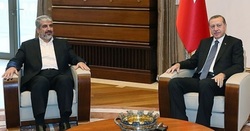
The Hamas delegation to Turkey has urged the Turkish leadership to insist on ending the blockade on the Gaza Strip as a condition for its reconciliation with Israel.
In a press release on Saturday, the Hamas Movement said that head of its political bureau Khaled Mishaal and a number of its senior members conducted talks in Istanbul with president Recep Erdogan, premier Binali Yıldırım and other Turkish officials.
The delegation highlighted the Palestinian people's hope that the Turkish leadership could succeed in having the blockade on Gaza lifted through its current reconciliation talks with Israel.
During the visit, the delegation congratulated the Turkish leadership on the formation of the new government and discussed with it several issues of mutual interests, including the latest developments in the Palestinian arena.
Recently, Turkish foreign minister Mevlut Cavusoglu said his country rejects any Israeli call for severing its ties with Hamas, which was elected by its own people.
Cavusoglu told a news conference that Turkey would also not renounce its demand for an end to the blockade on Gaza as a main demand in its reconciliation talks with Tel Aviv.
He also stated that Turkey's relations with Hamas would not represent an obstacle to the normalization of ties with Israel, affirming that Ankara would continue to be in touch with Hamas in order to achieve a comprehensive peace in the occupied territories.
Related: Family of prisoner Aaron asks Netanyahu to include him in Turkey deal
In a press release on Saturday, the Hamas Movement said that head of its political bureau Khaled Mishaal and a number of its senior members conducted talks in Istanbul with president Recep Erdogan, premier Binali Yıldırım and other Turkish officials.
The delegation highlighted the Palestinian people's hope that the Turkish leadership could succeed in having the blockade on Gaza lifted through its current reconciliation talks with Israel.
During the visit, the delegation congratulated the Turkish leadership on the formation of the new government and discussed with it several issues of mutual interests, including the latest developments in the Palestinian arena.
Recently, Turkish foreign minister Mevlut Cavusoglu said his country rejects any Israeli call for severing its ties with Hamas, which was elected by its own people.
Cavusoglu told a news conference that Turkey would also not renounce its demand for an end to the blockade on Gaza as a main demand in its reconciliation talks with Tel Aviv.
He also stated that Turkey's relations with Hamas would not represent an obstacle to the normalization of ties with Israel, affirming that Ankara would continue to be in touch with Hamas in order to achieve a comprehensive peace in the occupied territories.
Related: Family of prisoner Aaron asks Netanyahu to include him in Turkey deal
